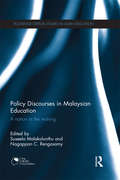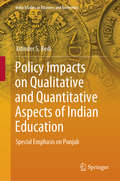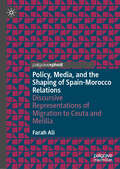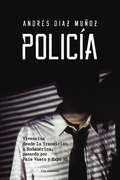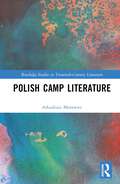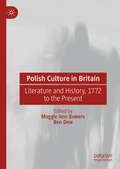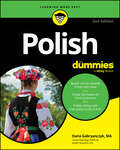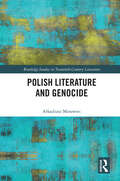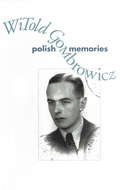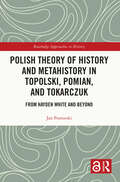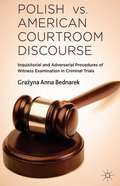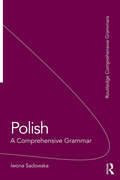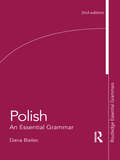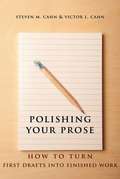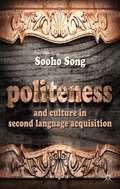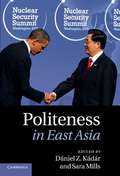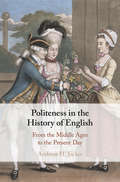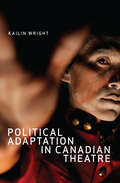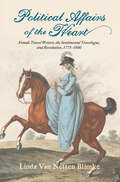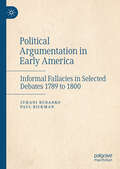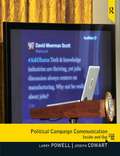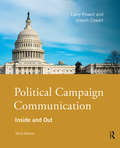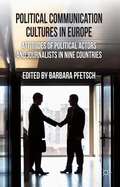- Table View
- List View
Policy Discourses in Malaysian Education: A nation in the making (Routledge Critical Studies in Asian Education)
by Suseela Malakolunthu Nagappan C. RengasamySince independence in 1957, Malaysia has become a globally-recognised industrial trading partner. With a 60% Muslim population, it also enjoys the reputation of being a moderate and peaceful nation. However, with just a short time left to realising its Vision 2020 of developed nationhood, the pathway of nation building still seems ambiguous. There is a brewing tension in its race and ethnic relations which has permeated the various fronts, namely politics, society, economics and education. This book analyses the education policies that have been formulated and implemented in Malaysia since independence. It demonstrates how these policy enactments have influenced the nation’s growth and transformation, and the challenges faced in creating a model of equity and multicultural co-existence among its racially and ethnically diversified people. Shedding light on these issues, it points towards the major mending that is needed for Malaysia to become a truly developed nation. Chapters include: Education of ethnic minorities in Malaysia: Contesting issues in a multiethnic society Access and equity issues in Malaysian higher education Graduate employability in government discourse: A critical perspective This comprehensive book is a case study on Malaysia that will supplement researchers and advance students in their understanding of a multi-racial society’s perspective and attitude towards education.
Policy Impacts on Qualitative and Quantitative Aspects of Indian Education: Special Emphasis on Punjab (India Studies in Business and Economics)
by Jatinder S. BediThe book focuses on the state of education and on the levels of inequality among gender, rural–urban and social groups. Taking into account the various findings from existing literature on the qualitative and quantitative aspects of education, it uses empirical findings based on a revised methodology to draw new conclusions. This revised method was devised to define the size of population eligible for enrollment and was then employed to estimate the Gross Enrollment Rate (GER) and Gross Literacy Rate (GLR) at various completed education levels, using age-wise data from the Population Census, 2011. This methodology is based on the concept that among those eligible for enrollment/literacy, a few never get chance to enrol and others achieve various levels of literacy by remaining engaged in formal or informal education up to various ages. The book comes up with findings that have deep significance so far as policy making is concerned towards improving the state of education in India. There are fourteen hypotheses that the book proposes based on the study and each hypothesis is accompanied with policy suggestions. Interestingly, one of the hypotheses is that arbitrariness of government policies creates more problems and, as such, before proposing a policy change the government needs to put in more effort and time in planning and come up with carefully chalked out processes. In addition to being a valuable resource for researchers working in this area, the book has huge policy implications and think tanks working towards improving education in India.
Policy and Planning for Endangered Languages
by Mari C. JonesLanguage policy issues are imbued with a powerful symbolism that is often linked to questions of identity, with the suppression or failure to recognise and support a given endangered variety representing a refusal to grant a 'voice' to the corresponding ethno-cultural community. This wide-ranging volume, which explores linguistic scenarios from across five continents, seeks to ignite the debate as to how and whether the interface between people, politics and language can affect the fortunes of endangered varieties. With chapters written by academics working in the field of language endangerment and members of indigenous communities on the frontline of language support and maintenance, Policy and Planning for Endangered Languages is essential reading for researchers and students of language death, sociolinguistics and applied linguistics, as well as community members involved in native language maintenance.
Policy, Media, and the Shaping of Spain-Morocco Relations: Discursive Representations of Migration to Ceuta and Melilla
by Farah AliThis book uses sociolinguistic approaches to explore how media discourse on undocumented migration informs Morocco-Spain political relations. Historically, much of the contact between these two nations has been through conquest - first through the Umayyad Caliphate taking control of the Iberian Peninsula (then called Hispania) in the 8th century, and then through Spain’s occupation of northern Morocco in the 20th century. Though these historical roots have undoubtedly played a role in shaping present-day Morocco-Spain relations, migration has also become another critical element, as the majority of legally authorized migration to Spain comes from Morocco. Additionally, Morocco serves as a sojourn for much of the undocumented migration to the Spanish autonomous cities of Ceuta and Melilla, both of which are enclaves in Morocco and common entry points for North African and Sub-Saharan African immigrants. Migration to Ceuta and Melilla has therefore become a flashpoint for anti-immigration attitudes that are frequently perpetuated in political and media discourse. The author uses these cities as a case study, situating them within the wider context of both immigration-related policies and news articles in order to examine how migration is represented in Spain and Morocco. The book connects media discourse with policy discourse, and addresses how these mediums (1) co-construct anti-immigration and xenophobic ideologies, and (2) shape and are shaped by the somewhat strained relations between Spain and Morocco. This book will be of interest to students and scholars of Discourse Analysis, Sociolinguistics, Migration Studies and Migration Policy, Media Studies and Political Communication.
Policía: Vivencias desde la Transición a Sudamérica, pasando por País Vasco y Expo 92
by Andrés Díaz MuñozLa realidad siempre supera a la ficción. La obra narra las vivencias y anécdotas profesionales del autor del libro, con una trayectoria profesional cercana al medio siglo. Inicia su crónica desde su ingreso en la corporación, continúa con la transición política española y, a lo largo de la narración, da cuenta de sus vivencias y anécdotas. <P><P>Desde cinco años antes de la Exposición Universal de Sevilla y hasta doce días antes de su conclusión, ostentó el cargo de responsable de los servicios de Información de la Policía, donde cesó a petición propia. Siendo Comisario Principal de la Policía, ocupó el cargo de Agregado de Interior en Bolivia, que ejerció durante cerca de siete años, bajo el paraguas de diplomático. <P><P>El ejercicio de su trabajo en Iberoamérica le dio a conocer aspectos curiosos de las policías de aquellos países, así como vivir directamente los conflictos que se originaron hasta la llegada de Evo Morales. Unlibro escrito con un lenguaje coloquial y desenfadado que resulta ameno y curioso para el lector.
Polish Camp Literature (Routledge Studies in Twentieth-Century Literature)
by Arkadiusz MorawiecPolish Camp Literature expands the boundaries of Polish camp literature, which has so far been defined too narrowly. This restricted outlook has been determined by politics, ideology, the scarcity of historical knowledge, the lack of literary research, and frequent manipulation concerning terms such as "concentration camp", "forced labor camp", and "death camp". Camp literature was initially limited to "Lager" literature (pertaining to Nazi German camps). Over time, gulag literature (pertaining to Soviet camps) came to be included as well. It turns out that Polish camp literature is much more extensive and richer. This volume consists of mini-monographs on Polish literary works concerning either a specific camp or a specific type (system) of camps. The chapters devoted to gulag literature (i.e. texts about the Solovetsky Special Purpose Camp and Lager literature (i.e. texts about Konzentrationslager Buchenwald) expand on established findings, while the following chapters deal with topics previously unexplored, namely, the literature relating to Polish camps, such as the prewar Place of Isolation in Bereza Kartuska and the postwar communist concentration and labor camps in Łambinowice and Jaworzno, the Spanish (Francoist) Campo de Concentración de Miranda de Ebro, and the Japanese Unit 731 and its research center in Pingfang (Manchuria), which included – on top of laboratories and chemical and bacteriological weapons production units – a prison, a gas chamber, and crematoria. This book is intended to provide the impetus not just for further investigation into the unknown and insufficiently recognized areas of Polish camp literature, but also – through embedding the Polish literary output in the context of other national literatures, and by means of their cross-comparison – for charting a map of world camp literature.
Polish Culture in Britain: Literature and History, 1772 to the Present
by Ben Dew Maggie Ann BowersThis edited volume explores the historical, cultural and literary legacies of Polish Britain, and their significance for both the British and Polish nations. The focus of the book is twofold. First, it investigates the history of Polish immigration and the ways in which Polish immigrants have conceptualised their own experiences and encounters with Britain and the British. Second, it examines how Poles and Poland have been represented by Anglophone writers in both fictional and non-fictional forms of discourse. Inevitably, these issues are intertwined. Polish experiences of Britain have been shaped, in part, by British ideas about Poland, just as British notions of Poland have been transformed by the emergence of large and culturally active Polish communities in the UK. By studying these issues together, this volume develops a wide-ranging and original analysis of Polish Britain.
Polish For Dummies
by Daria GabryanczykEverything you need to speak Polish quickly and confidently Polish For Dummies gets you started with Polish language basics, so you can communicate with friends and loved ones, work and travel in Poland, or just enjoy the excitement of learning a new language. You'll learn the foundations of Polish grammar and how to engage in basic conversations. With the tried-and-true Dummies language learning method, you'll start speaking authentically right away, so you can interact in everyday situations. You'll also learn about social and cultural references that will help you keep up in Polish conversations. With access to audio files for dialogs in the book, you can improve your listening and pronunciation, too. This book makes it easy and practical to become a Polish speaker. Learn tips and tricks for improving your Polish language skills Access helpful verb conjugation tables, essential vocabulary lists, and straightforward pronunciation guides Master everyday words and phrases Discover Polish history, culture, and common colloquial expressions Polish For Dummies is perfect for anyone who wants to learn the basics of the Polish language or brush up on what they already know—no previous experience needed.
Polish Literature and Genocide (Routledge Studies in Twentieth-Century Literature)
by Arkadiusz MorawiecPolish Literature and Genocide presents the attitude of national literature to the twentieth-century acts of genocide. This volume examines the reflection of the Holocaust and the massacre in Srebrenica in a rich, detailed, and comprehensive way, expanding the existing research and, in some cases, challenging the former sometimes ossified ideas. Polish literature also records what had been largely overlooked: the extermination of disabled and mentally ill people, the Roma and Sinti, and the Soviet prisoners of war by the Nazis. This volume includes analysis of the literary works of Władysław Szlengel, the most prominent Polish-language poet in the Warsaw ghetto; the peculiar reception of Julian Tuwim’s famous poem for children “Locomotive;” the memoir of Leon Weliczker, a prisoner of the Janowska concentration camp in Lviv and a member of the ‘death brigade’ (Sonderkommando); the origins of Medallions by Zofia Nałkowska, who ‘processed’ historical documents into literature and contributed to the making of professor Rudolf Spanner’s ‘dark legend’, and the textual origins of Tadeusz Różewicz’s ‘poetry after Auschwitz.’ Furthermore, this volume addresses issues related to the genesis and function of ‘genocide literature’ –– aesthetic, cognitive, ideological, and social. This volume will be a crucial resource for academics interested in key debates within Holocaust studies.
Polish Memories
by Witold Gombrowicz Bill JohnstonAlthough Witold Gombrowicz's unique, idiosyncratic writings include a three-volume Diary, this voluminous document offers few facts about his early life in Poland before his books were banned there and he went into voluntary exile. Polish Memories-a series of autobiographical sketches Gombrowicz composed for Radio Free Europe during his years in Argentina in the late 1950s-fills the gap in our knowledge.Written in a straightforward way without his famous linguistic inventions, the book presents an engaging account of Gombrowicz's childhood, youth, literary beginnings, and fellow writers in interwar Poland and reveals how these experiences and individuals shaped his seemingly outlandish concepts about the self, culture, art, and society. In addition, the book helps readers understand the numerous autobiographical allusions in his fiction and brings a new level of understanding and appreciation to his life and work.
Polish Theory of History and Metahistory in Topolski, Pomian, and Tokarczuk: From Hayden White and Beyond (Routledge Approaches to History)
by Jan PomorskiThis book traces the development of the Polish theory of history, analysing how Jerzy Topolski, Krzysztof Pomian, and Olga Tokarczuk have both built upon and transgressed the metahistorical theories of American historian Hayden White. Poland’s reception of White’s work has gone through different phases, from distancing to a period of fascination and eventual critical analysis, beginning with Topolski's methodological school in the 1980s. Topolski played a major role in international debates on historical theory in the second half of the 20th century. The book’s second study is a rare opportunity for English-speaking audiences to engage with the thoughts of Pomian, a philosopher and historian of ideas who has both complemented and developed theories of historical cognition independently from White. In the final chapter, the book presents a study of the historical imagination in 21st-century Central and Eastern Europe through the work of novelist Tokarczuk, the winner of the 2018 Nobel Prize in Literature. In considering the contributions of these three thinkers, the book explores the active process by which past becomes history and thus motivates contemporary actions and realities. By deconstructing and reconstructing contemporary theories of history, this research is a unique contribution to the fields of historiography and the philosophy of history.
Polish vs. American Courtroom Discourse: Inquisitorial and Adversarial Procedures of Witness Examination in Criminal Trials
by Grażyna Anna BednarekPolish vs. American Courtroom Discourse brings together the fields of discourse analysis and socio-legal studies to identify, illustrate and explain the cross-cultural similarities and disparities between the inquisitorial and adversarial procedures of witness examination in criminal trials.
Polish: A Comprehensive Grammar (Routledge Comprehensive Grammars)
by Iwona SadowskaPolish: A Comprehensive Grammar is a complete reference guide to the grammar system for intermediate to advanced learners of Polish. It presents an accessible and systematic description of the language, focusing on real patterns of use in contemporary Polish. The Grammar is a comprehensive work and an invaluable resource for students and anyone interested in linguistics and the way modern Polish works. Features include: coverage of all parts of speech full cross referencing well selected and illuminating examples. The book is organised in such a way to promote a thorough understanding of Polish at all levels of structure; the sound system, formation of word and phrases and sentence construction. It offers a stimulating analysis of the complexities of the language, providing clear explanations and examples of each point. Polish: A Comprehensive Grammar is the essential reference work on Polish grammar for all learners and users of the language.
Polish: An Essential Grammar (Routledge Grammar Workbooks Ser.)
by Dana BielecPolish: An Essential Grammar is a user-friendly guide to all the important structures of this fascinating language. Presenting a fresh and accessible description of the language, this engaging grammar uses clear, jargon-free explanations and sets out the complexities of Polish in short, readable sections. Key features include: New chapter on studying an inflected language, including detailed analysis of a typical text Comprehensive descriptions of the parts of speech covered Information presented clearly and logically in table form Wealth of real-life examples Nine clearly-presented appendices. This grammar is an invaluable asset to anyone wishing to master the Polish language as it is spoken today. Two companion books, Basic Polish: A Grammar and Workbook and Intermediate Polish: A Grammar and Workbook, provide more detailed practice in the language.
Polishing Your Prose: How to Turn First Drafts Into Finished Work
by Steven Cahn Victor CahnThis singular book illustrates how to edit a piece of prose and enhance its clarity of thought and felicity of style. The authors first present ten principles of effective composition, and then scrutinize three extended paragraphs, suggesting with remarkable specificity how to improve them. The volume also offers challenging practice questions, as well as two finished essays, one serious and one humorous, that demonstrate how attention to sound mechanics need not result in mechanical writing. Steven M. Cahn and Victor L. Cahn help readers deploy a host of corrective strategies, such as avoiding jargon, bombast, and redundancy; varying sentence structure; paring the use of adjectives and adverbs; properly deploying phrases and clauses; and refining an argument. Here is a book for all who seek to increase their facility in written communication.
Politeness and Culture in Second Language Acquisition
by Sooho SongThis book examines the importance of politeness in pragmatic expression and communication, making a significant contribution to the debate over whether the universal politeness theory is applicable globally regardless of cultural differences.
Politeness in East Asia
by Sara Mills Dániel Z. KádárWe use politeness every day when interacting with other people. Yet politeness is an impressively complex linguistic process, and studying it can tell us a lot about the social and cultural values of social groups or even a whole society, helping us to understand how humans 'encode' states of mind in their words. The traditional, stereotypical view is that people in East Asian cultures are indirect, deferential and extremely polite - sometimes more polite than seems necessary. This revealing book takes a fresh look at the phenomenon, showing that the situation is far more complex than these stereotypes would suggest. Taking examples from Japanese, Korean, Chinese, Vietnamese and Singaporean Chinese, it shows how politeness differs across countries, but also across social groups and subgroups. The first comprehensive study of the subject, this book is essential reading for those interested in intercultural communication, linguistics and East Asian languages.
Politeness in the History of English: From the Middle Ages to the Present Day
by Andreas JuckerThe concept of politeness permeates all aspects of modern life and society. However, to what extent has this phenomenon changed over time? This book traces the elusive concept of politeness from its beginnings in the Middle Ages up to the present day. Detailed case studies of mostly literary texts provide insights into historically specific ways of being polite, from discernment politeness in Old English to recent examples, such as non-imposition politeness. Readers will gain a better understanding of both the folk-notion of politeness and specific scholarly definitions, and how these can be applied to historical data. The long diachrony provides a novel perspective both on the concept of politeness and on the history of the English language in its social context, making this essential reading for politeness specialists, cultural historians and historical linguists alike. Politeness emerges as a multifaceted phenomenon that is both culture-specific and history-specific.
Politeness: some universals in language usage
by Penelope Brown Stephen C. LevinsonThis study is about the principles for constructing polite speech. The core of it first appeared in Questions and Politeness, edited by Esther N. Goody (now out of print). It is here reissued with a new introduction which surveys the now considerable literature in linguistics, psychology and the social sciences that the original extended essay stimulated, and suggests new directions for research. The authors describe and account for some remarkable parallelisms in the linguistic construction of utterances with which people express themselves in different languages and cultures. A motive for these parallels is isolated - politeness, broadly defined to include both polite friendliness and polite formality - and a universal model is constructed outlining the abstract principles underlying polite usages. This is based on the detailed study of three unrelated languages and cultures: the Tamil of South India, the Tzeltal spoken by Mayan Indians in Chiapas, Mexico, and the English of the USA and England, supplemented by examples from other cultures. Underneath the apparent diversity of polite behaviour in different societies lie some general pan-human principles of social interaction, and the model of politeness provides a tool for analysing the quality of social relations in any society. This volume will be of special interest to students in linguistic pragmatics, sociolinguistics, applied linguistics, anthropology, and the sociology and social psychology of interaction.
Political Adaptation in Canadian Theatre
by Kailin WrightIn Canada, adaptation is a national mode of survival, but it is also a way to create radical change. Throughout history, Canadians have been inheritors and adaptors: of political systems, stories, and customs from the old world and the new. More than updating popular narratives, adaptation informs understandings of culture, race, gender, and sexuality, as well as individual experiences. In Political Adaptation in Canadian Theatre Kailin Wright investigates adaptations that retell popular stories with a political purpose and examines how they acknowledge diverse realities and transform our past. Political Adaptation in Canadian Theatre explores adaptations of Canadian history, Shakespeare, Greek mythologies, and Indigenous history by playwrights who identify as English-Canadian, African-Canadian, French-Canadian, French, Kuna Rappahannock, and Delaware from the Six Nations. Along with new considerations of the activist potential of popular Canadian theatre, this book outlines eight strategies that adaptors employ to challenge conceptions of what it means to be Indigenous, Black, queer, or female. Recent cancellations of theatre productions whose creators borrowed elements from minority cultures demonstrate the need for a distinction between political adaptation and cultural appropriation. Wright builds on Linda Hutcheon's definition of adaptation as repetition with difference and applies identification theory to illustrate how political adaptation at once underlines and undermines its canonical source. An exciting intervention in adaptation studies, Political Adaptation in Canadian Theatre unsettles the dynamics of popular and political theatre and rethinks the ways performance can contribute to how one country defines itself.
Political Affairs of the Heart: Female Travel Writers, the Sentimental Travelogue, and Revolution, 1775-1800 (Transits: Literature, Thought & Culture 1650-1850)
by Linda Van BlimkeRichly researched and engagingly written, Political Affairs of the Heart traces the emergence of female sentimental travel writing in late eighteenth-century Britain, and posits its centrality to women’s engagement with national and gender politics. This study examines four travel narratives written by women between 1774 and 1795, convincingly arguing that they effectively deploy the discourse of sensibility to engage with debates around Britain’s national identity during the French and American Revolutions. Van Netten Blimke contends that Laurence Sterne’s A Sentimental Journey (1768)—which first introduced sentimental discourse to the travelogue—facilitated women’s gradual inclusion into this previously male-dominated genre, effectively paving the way for women to influence the country’s sociopolitical transformation. These four previously understudied works successfully combine eyewitness authority with the language of sensibility to mount impassioned interventions in their nation’s perception and practice of revolutionary politics, at a time when its national identity was most in flux.
Political Argumentation in Early America: Informal Fallacies in Selected Debates 1789 to 1800
by Juhani Rudanko Paul RickmanThis book investigates the language used by protagonists in four major political debates in the early history of the United States. The first of these concerns the controversy in the first United States House of Representatives in the summer of 1789 on whether a proposal for a bill of rights should be considered in an expeditious fashion or whether the issue should be left till much later. The second is the principal debate on whether a sedition act should be enacted in July 1798, and the third concerns the enactment of the Logan Act of 1799. The fourth investigates the elections for the Legislature of the State of New York in the spring of 1800, which was the key event affecting the outcome of the presidential election of 1800. In each case there was a sharp disagreement between groups of politicians representing different points of view, and each event was significant from the point of view of the political history of the United States. The authors introduce these four debates, as well as the notion of informal fallacy - taken to designate an argument that is unsatisfactory in some way - before analysing deceptive fallacies and demonstrating how fallacy theory can be used as a critical tool in the examination of political argumentation. This book will be of interest to students and scholars of political communication, rhetoric and argumentation, US history and politics, and diachronic linguistics, especially diachronic pragmatics.
Political Campaign Communication: Inside and Out
by Larry Powell Joseph CowartPolitical Campaign Communication: Inside and Out examines the ins and outs of political campaigning through the eyes of both an academic and a political consultant. This text takes a unique approach to the subject of campaign communication by examining its intricacies from views both inside and outside of the process. Unlike many texts in this field, Political Campaign Communication: Inside and Out takes a broad view of political campaigning, discussing theories and principles, along with topics such as political socialization, the role of money, ethics, and critical events.
Political Campaign Communication: Inside and Out (Lexington Studies In Political Communication Ser.)
by Larry Powell Joseph CowartNow in its third edition, Political Campaign Communication: Inside and Out examines the intricacies of political campaigning through the eyes of both an academic and a political consultant. Unlike others in its field, this text takes a broad view of political campaigning, discussing both theories and principles, along with topics such as political socialization, the role of money, ethics, and critical events. This new edition delves into ongoing changes in the American political environment, with fuller examinations of women and gender, the involvement of social media in political campaigning, political money, and ethics. Advanced undergraduate and graduate students of political communication can make use of updated chapter-by-chapter discussion questions and online practice quizzes.
Political Communication Cultures in Europe
by Barbara PfetschThis book offers new and compelling insight into the orientations that shape the cultures of political communication in nine Western democracies. It is a truly comparative account of the views of 2500 political elites and media elites between Helsinki and Madrid on their relationship and their exchanges.
